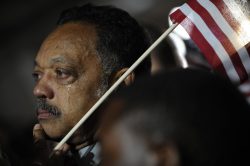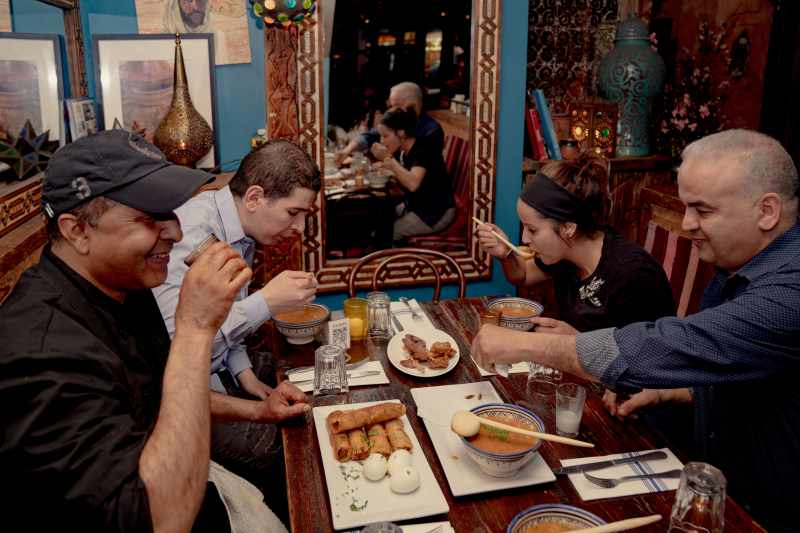
From left: Chef Mohamad Fekkak, servers Kairy Dean and Khalida Djeriou and owner Mehenni Zebentout break fast together at Nomad restaurant.
12:32 JST, April 8, 2022
“You don’t understand,” said Khalida Djeriou, who has worked as a server across New York City ever since immigrating from Algeria in 2013. “In this situation, even parsley looks delicious.”
Often ignored in the pandemic’s up-and-down, zig-and-zag, here-and-gone restaurant policies is a higher mandate that applies to 4 million people nationwide. They are tasked by God with a directive that is both centuries-old and recognized by pandemic CDC tweets: Ramadan, the ninth month of Islam’s lunar calendar, which marks the revelation of the Koran to the prophet Muhammad by the archangel Gabriel with broad, month-long, dawn-to-sunset fasts that end with a three-day festival called Eid al-Fitr, the festival of breaking the fast.
Djeriou knows it’s a particularly delicate time for restaurant workers, whose workplaces have become flashpoints of conflict, creativity, empathy, exploitation, limbo and solidarity. Like vaccinated health care workers who have a professional duty to unvaccinated patients – or vice versa – Ramadan-adherent restaurant workers navigate the paradoxical crossroads of sawm (fasting) and indulgence. It is forbidden in Ramadan to drink water or chew gum. So imagine cooking and serving your childhood favorites.
Djeriou is nervous about this year’s Ramadan – April 2 to May 1 – because it’s her first time waiting tables around the food of her childhood and home culture (her favorite is harira, a tomato-and-legume soup). “I lived for five years in Staten Island and worked at an Italian restaurant there,” she said. “It was easier to fast around lasagna than my favorites.”
She now works at Nomad, an Algerian restaurant in Manhattan owned by Mehenni Zebentout, who is bracing for the month’s cosmopolitan surrealism in which $16 iftar platters – the traditional breaking of the fast with dates, milk, a boiled egg, harira, housemade bread, a beef bourek and a cookie – will become wildly popular even among non-Muslim diners, often selling out for the night. It’s as if communion wafers or afikomens achieved momentary Cronut-level frenzy.
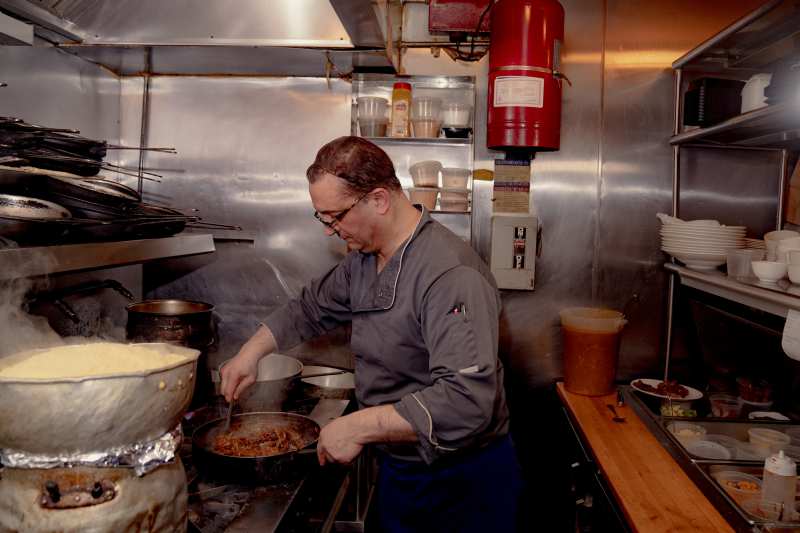
Karim Lahcene, Nomad’s chef.
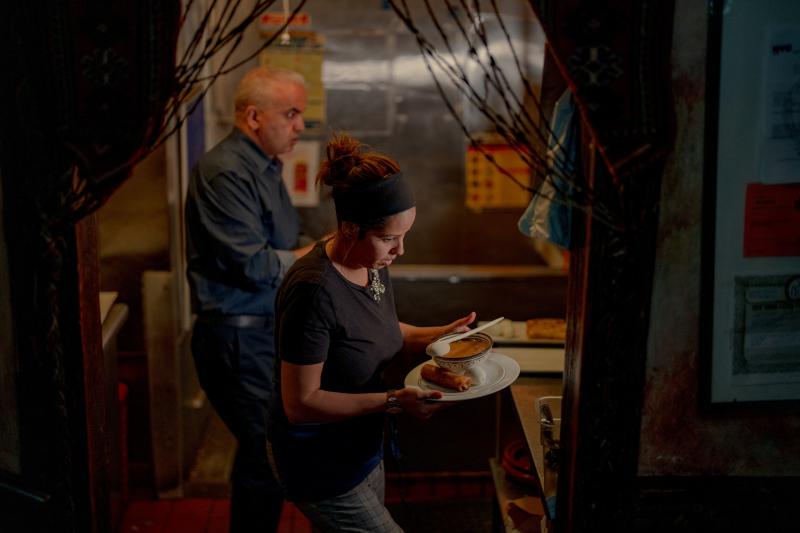
Owner Mehenni Zebentout and server Khalida Djeriou at Nomad.
To cope during Ramadan, Nomad’s chef, Karim Lahcene, is at times wearing a cold towel around his neck in the kitchen. Djeriou is wearing lip balm (unflavored, of course). In all, 70% of Nomad’s staff is fasting.
Fasts that are broken accidentally – by swallowing toothpaste or shower water, for example, or absentmindedly tasting iftar as you prepare it – can continue unbroken. Even intentionally broken fasts can be redeemed by fasting for 60 consecutive days or providing meals for 60 people in need through an act called kafarrah. Children are spared until puberty, although some dabble at younger ages. Fasts can also be broken by profanity or lying, which is why trash talkers during Ramadan may hear the retort “go eat.”
“It elevates your palate in a way because you’re not going to waste the little space you have to eat on something that’s not great,” said Amanda Saab, the first woman in a hijab (a Muslim headscarf) on an American cooking show.
But, added Zebentout, Nomad’s owner: “Imagine Thanksgiving or Christmas, but every day for 30 days. There’s a lot of wasted food, man. People buy five kinds of soda or five kinds of meat. But they’re full after a bowl of soup.”
Ramadan in America is not just an obstacle course of the physical exhaustion of fasting but also of the emotional exhaustion of otherness.
“Immigrants and children of immigrants come here and have this identity crisis as Muslims, as Arabs, as Americans. Where do we fit in? How do we fit in?” Saab said. “But there’s a range of religiosity and how strict people are with different rules. Just like there is in Judaism and Christianity. It’s a blessing of personal expression, which is what America is all about. Soul food is Muslim food.”
Although Islam is often described as a modern indicator of diversity, America was built on Muslim cooks. Of the 10 million Africans abducted over the nation’s 246-year-long slavery trade, as many as half were Muslims, according to an analysis by Harvard University. For example, Omar Ibn Said, a wealthy Muslim scholar in what is now Senegal, was enslaved in 1831 and sold in slavery markets in South Carolina. And in 1807, two enslaved Muslims in Kentucky begged for freedom in a letter written in Arabic that reached President Thomas Jefferson, one of at least 12 U.S. presidents who enslaved people.
Islam had spread across Africa since the 7th century and was deeply rooted in such hubs as Larabanga Mosque, built in 1421 in what is now Ghana and known as “the Mecca of West Africa.” A Brazilian slavery revolt in 1835 occurred during Ramadan, and it’s sometimes called the Ramadan Revolt. And WPA interviews with formerly enslaved Muslim Americans recalled that they shared covert rice cakes with one another on feast days during their bondage.
America’s military has also long enmeshed Islam into national policy, from the founding of the Navy for the express purpose of fighting Muslim pirates to the present-day placement of refugees from U.S. wars in Afghanistan and Iraq. Such refugees are now searching for jobs in scattered states. Afghan refugees in February 2022 totaled 10,402 in Texas, 8,021 in California, and 5,047 in Virginia, among thousands of others, according to the Department of Homeland Security’s Operation Allies Welcome program.
Many Americans regard restaurant work as an ever-available fallback plan, but Muslims have faced incidents of discrimination as both workers and diners. In 2019, while a Muslim man in Missouri was trying to buy $50 worth of food from Taco Bell for suhoor, Ramadan’s pre-dawn feast, a drive-through worker made an obscene comment and told him “I’m not going to cater to you, you’re going to need to cater to me ’cause this is on my territory.” In Texas in pre-pandemic 2020, a woman was sent home from her job at Chicken Express for refusing to remove her hijab. Later that month, in New Jersey, a former Applebee’s supervisor sued the company, claiming she was wrongfully terminated after kicking out customers who made anti-Muslim remarks. And last year a 19-year-old woman working at a Chipotle in Kansas had her hijab forcibly removed by her manager. (Muslim men who work in restaurants are also harassed for their taqiyahs, religious hats often called in the United States by their secular name, kufis.) Even restaurants that are popular with Muslims during Ramadan, such as IHOP and its famed suhoor services, can have cultures of bigotry, as with a location in Texas where four fired Arab employees alleged that the owner compared Muslims waiting to break their fast to “dogs waiting for their meal.”
An irony of culinary Islamophobia is that many common foods – alcohol, apricots, candy, coffee, lemons, oranges and sugar – owe their English names to Arabic origins. And some traditional iterations of what has become America’s gastronomic sweetheart – the taco – have been deeply influenced by Arabs.
The everyday reality is that diners are served regularly by restaurant workers who are fasting year-around – a cocktail from a sober bartender, a steak from a vegetarian waiter or a pizza delivered by a lactose-intolerant or gluten-allergic driver – let alone practitioners of Ekadashi, Lent, Yom Kippur, trendy intermittent fasting, Beyoncé-backed cleanses, tech-bro liquid diets, or old-fashioned dodging of carbs and sweets. Why then does the specific fasting of Ramadan hit this commonplace habit differently?
A synthesis of interviews with Ramadan-practicing restaurant workers nationwide – some of whom spoke on the condition of anonymity because they fear for their safety or have shame that their work is haram (such as bartending) – touched on many theories.
Perhaps the problem is Ramadan’s irregularity, given that its lunar calendar flux means it can happen at any time of the year (in 2030, it will happen twice). Or Islam’s bigoted association with extremism and radicalism. Many Americans also don’t realize that the largest Muslim populations are in Indonesia, Pakistan, India, Bangladesh and Nigeria. Or its confusing flexibility – anyone breastfeeding, elderly, ill, menstruating, pregnant or traveling need not fast (often redeemed in a penance called fidyah). Maybe it’s just plain ignorance and misdirected fear or uncertainty.
As U.S. mosques have more than doubled from 1,209 in 2000 to 2,769 in 2020, do views change for those whose lives have existed entirely in post-9/11 America?
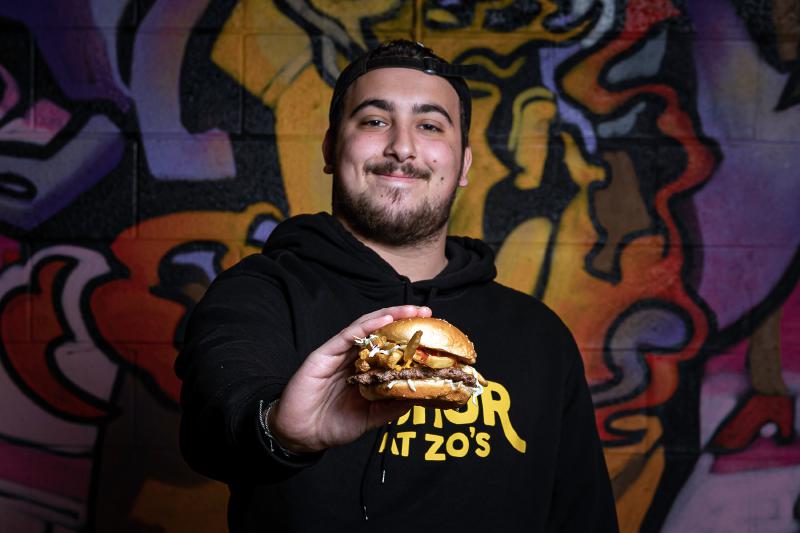
Ali Berry with the Lebanese burger that tempts him at Zo’s Good Burger in Dearborn, Mich.
Ali Berry is a teen employee at Zo’s Good Burger, an Arab-owned local chain in Dearborn, Mich., the heart of Arab America.
“We have hundreds of orders right at the end of the fast, for iftar, and it gets tough. Every order that comes in comes through me because I work quality assurance. Every single one,” he said.
In those iftar rushes, his chief frenemy sandwich – frenemesis? – is the Lebanese burger: a quarter-pound beef patty on a sesame bun, stuffed with fries, ketchup, coleslaw, and American cheese. “It really just throws me off every time I have to wrap it up,” he said. To soldier through, he relies on his discipline not just as a Muslim but also as a baseball and soccer athlete.
“From when I was young, my parents would tell me to give 100%, 100% of the time,” he said. “No matter what I go through, someone else is going through worse. So, no matter the situation, I try for the best situation possible.” Pressed to his Ramadan breaking point, he said, he’ll gargle ice water but spit it out.
When iftar arrives – smack in the middle of the burger joint’s busy high-point – two or three workers at a time will take 15-minute breaks to enjoy their meals. Berry always breaks his fast with a single date and a bottle of water, then either food from home or something off the menu. The choice of who gets to eat when is “random,” he said. “We’re all trying to put others first, so it’s more of an argument – no, you go first! no, you! – than a decision,” he jokingly explained.
An additional complicating factor for Ramadan’s restaurant workers is nafas, the Arabic concept that translates as “breath” and refers to something akin to culinary mojo.
Djamila Bakour, who owns La Recette Patisserie in Durham, N.C., is hoping for good nafas as she develops the at-home bakery into a proper bricks-and-mortar shop. She is running a Kickstarter and so actively engaged in tempting others, even as she avoids that temptation herself. To be able to taste, her baking schedule has shifted to more like same-24-hours batches instead of same-day batches. “I know some people taste and spit, but I don’t trust myself,” she laughed.
“There is definitely pre-Ramadan,” she said. “Especially for coffee.” Like many Muslim coffee drinkers, Bakour cuts out coffee ahead of Ramadan so that caffeine withdrawal doesn’t exacerbate fasting. Empathy, she said, has gotten better in recent years: “People – customers, suppliers, whoever – have learned how to accept Ramadan even without understanding it.”
Of course, Ramadan’s focus is on its practitioners’ relationship with God, whose mysterious ways apply to stomachs as well as hearts and minds.
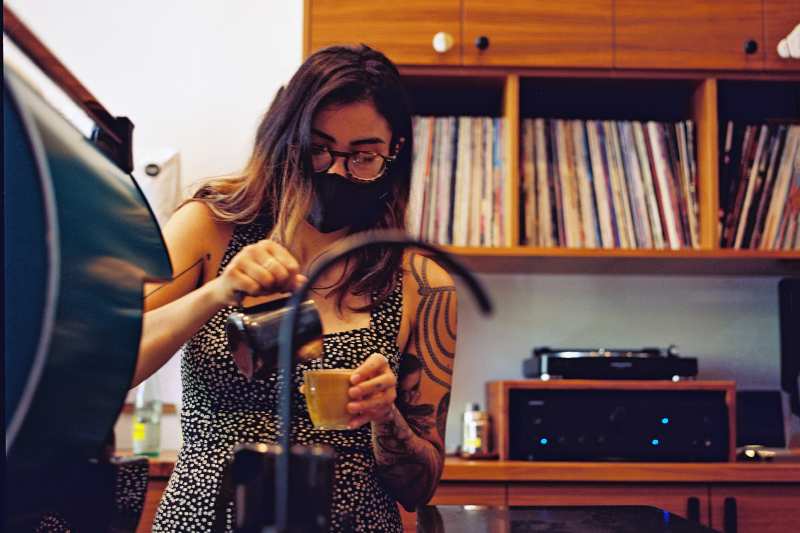
Esar Aadil, owner of Soul Chai in Salt Lake City, pours herself a chai.
As a teen, Esar Aadil, a barista, coffee consultant and tea merchant in Salt Lake City, encountered a dietary restriction beyond Ramadan: sudden allergies to dairy and eggs.
“My way of coping naturally was making those foods for other people,” she said. “I suddenly couldn’t eat dairy or eggs, so I was just baking for my siblings. That’s how to enjoy it in a way. The best bursts of aroma happen while making coffee, preparing it for the customer.” (Pandemic Ramadan selflessness has earned praise by California Gov. Gavin Newsom.)
Aadil continued: “Hopefully Ramadan for people in hospitality is a time when you’re revisiting what drew you to that space. Hopefully it’s feeding you even on an empty stomach. It’s not just about being devout. It serves this great purpose of sitting with yourself, this oddly peaceful place. There’s a stillness about it, and it reveals to me whether how I’m living my life is sustainable or not. Last year I was working at a coffee shop that wasn’t taking the pandemic seriously, and I was the only person of color, and it was during Ramadan when the switch just flipped and I was like ‘This isn’t the right place for me.'”
In many ways, Ramadan embodies food’s holy trinity: mindfulness, community and personal history – including personal growth. Its observance is so essential to Islam that it is enshrined as one of the faith’s five pillars. But all that sanctity can have damn human moments.
On the first day of Ramadan earlier this month, Djeriou writhed in the aromatic allure of Nomad’s lamb tagine, a shank braised with ras el hanout (a Moroccan spice blend), caramelized onions, garlic and honeyed prunes and apricots stewed in lamb broth with toasted sesame seeds and almonds.
“It smelled so good that it made me dizzy,” she said. Then she doubled down on a Ramadan loophole: You can smell food as much as you want while fasting. “I recommended that dish to everyone, mostly so I had more opportunity to smell it,” she laughed. “God blessed me with a nose and I made good use of God’s gift.”
Nomad sold 53 lamb tagines that day, including 38 sold by Djeriou alone. She took the following day off.
Top Articles in News Services
-

Survey Shows False Election Info Perceived as True
-

Prudential Life Expected to Face Inspection over Fraud
-

Hong Kong Ex-Publisher Jimmy Lai’s Sentence Raises International Outcry as China Defends It
-

Japan’s Nikkei Stock Average Touches 58,000 as Yen, Jgbs Rally on Election Fallout (UPDATE 1)
-

Trump Names Former Federal Reserve Governor Warsh as the Next Fed Chair, Replacing Powell
JN ACCESS RANKING
-

Japan PM Takaichi’s Cabinet Resigns en Masse
-

Japan Institute to Use Domestic Commercial Optical Lattice Clock to Set Japan Standard Time
-

Israeli Ambassador to Japan Speaks about Japan’s Role in the Reconstruction of Gaza
-

Man Infected with Measles Reportedly Dined at Restaurant in Tokyo Station
-

Man Infected with Measles May Have Come in Contact with Many People in Tokyo, Went to Store, Restaurant Around When Symptoms Emerged





